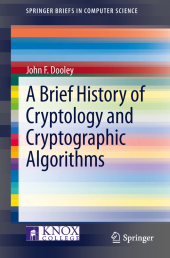 Neuerscheinungen 2013Stand: 2020-01-07 |
Schnellsuche
ISBN/Stichwort/Autor
|
Herderstraße 10
10625 Berlin
Tel.: 030 315 714 16
Fax 030 315 714 14
info@buchspektrum.de |

John F. Dooley
A Brief History of Cryptology and Cryptographic Algorithms
2013. 2013. xii, 99 S. 33 SW-Abb., 11 Tabellen. 235 mm
Verlag/Jahr: SPRINGER, BERLIN; SPRINGER INTERNATIONAL PUBLISHING 2013
ISBN: 3-319-01627-X (331901627X)
Neue ISBN: 978-3-319-01627-6 (9783319016276)
Preis und Lieferzeit: Bitte klicken
The science of cryptology is made up of two halves. Cryptography is the study of how to create secure systems for communications. Cryptanalysis is the study of how to break those systems. The conflict between these two halves of cryptology is the story of secret writing. For over 2,000 years, the desire to communicate securely and secretly has resulted in the creation of numerous and increasingly complicated systems to protect one´s messages. Yet for every system there is a cryptanalyst creating a new technique to break that system. With the advent of computers the cryptographer seems to finally have the upper hand. New mathematically based cryptographic algorithms that use computers for encryption and decryption are so secure that brute-force techniques seem to be the only way to break them - so far. This work traces the history of the conflict between cryptographer and cryptanalyst, explores in some depth the algorithms created to protect messages, and suggests where the field is going in the future.
Introduction: A Revolutionary Cipher
Cryptology Before 1500: A Bit of Magic
The Black Chambers: 1500 - 1776
Crypto goes to War: 1861 - 1865
Crypto and the War to End All Wars: 1914 - 1917
The Interwar Period: 1919 - 1939
The Coming of the Machines: 1918 - 1945
The Machines Take Over: Computer Cryptography
Alice and Bob and Whit and Martin: Public Key Crypto
From the reviews:
"The primary value of the work is for those interested in the development of DES and AES, or for those working on the key exchange issue, which lies at the heart of the RSA algorithm. It will also be useful for readers who might want to use it as a text in computer security courses, especially since that is how the author intended it in the first place." (G. Mick Smith, Computer Reviews, March, 2014)


